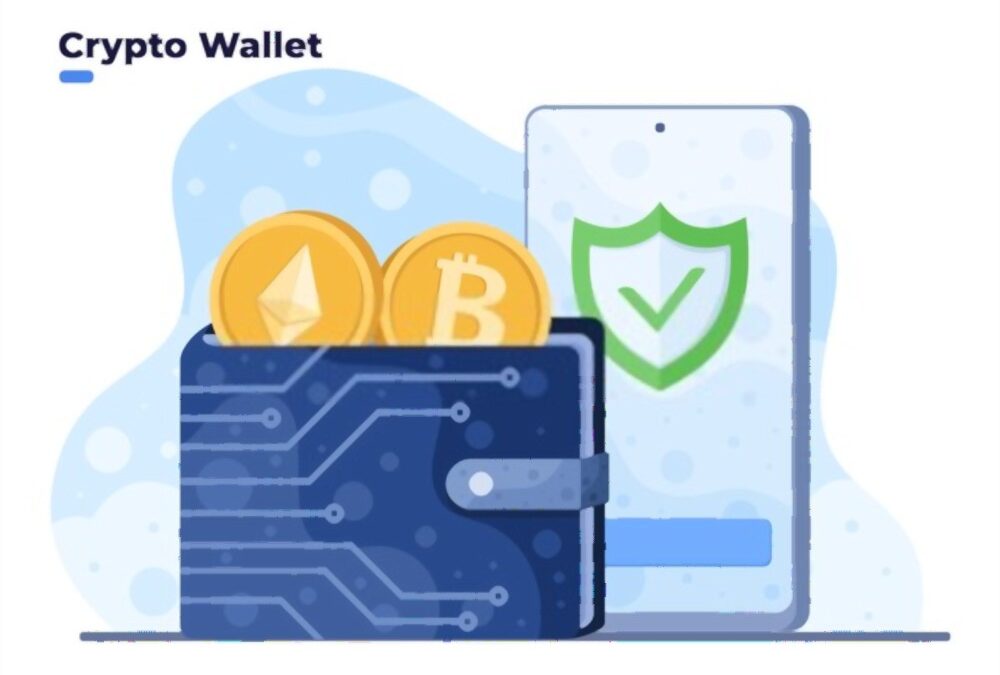Cryptocurrency wallets are used to store, keep, and spend cryptocurrencies like Bitcoin and Ethereum. These wallets come with unique keys or addresses, and each key is unique to particular users. Essentially, these keys give users some form of security to crypto coins.
Cryptocurrency wallets are like a bank account where you keep your money, except in this case, you’re storing your crypto assets in a digital wallet.
As you can imagine, cryptocurrency wallets come in different shapes and forms. The one you end you choosing depends on what you’re looking for. Traders, cryptocurrency exchanges, and third-party vendors all provide cryptocurrency wallets.
This article will explore and review some of the best cryptocurrency wallets.
Ten best multi-cryptocurrency wallet
eToro – The Best Cryptocurrency Wallet to use
Coinbase – A Good Cryptocurrency Wallet Platform for Beginners
Binance – A Good Cryptocurrency Wallet for Trading
Huobi – One of the best Bitcoin Wallet App to Expand Investments
Kraken – A good Cryptocurrency Web Wallet for Ease
Crypto.com – A Good Cryptocurrency platform based on its Security
Coinjar – Best Bitcoin Wallet for Long-Term Investors
Luno – Best Custodial Bitcoin Wallet
Exodus– Best Crypto Wallet with Hardware Support
Mycelium – Great Bitcoin Wallet for Confidentiality and privacy
CoinCorner– A Good Bitcoin Wallet for Beginners
eToro:

eToro tops our list as one of the best cryptocurrency wallets in terms of its security, assets diversity, and features. The platform is regulated by strong institutions like the SEC, FCA, ASIC, and CYSEC. Its also licensed by GFSC.
eToro is also a 100% commission-free broker. You don’t get charged for any transactions. It has very large storage for users to keep all their cryptocurrency assets. It also supports over 120+ cryptocurrencies, including Bitcoins.
You can get the mobile app wallet on both Playstore and iOS. Exchanging cryptocurrencies is also possible with the eToro Bitcoin wallet. With over 500 crypto-pairs on offer, you don’t have to rely on a third-party exchange to trade a specific digital coin. You can even copy experts trade with eToro’s copy trading Tools.
You can also use it on your Windows, Mac, and Linux.
Coinbase:
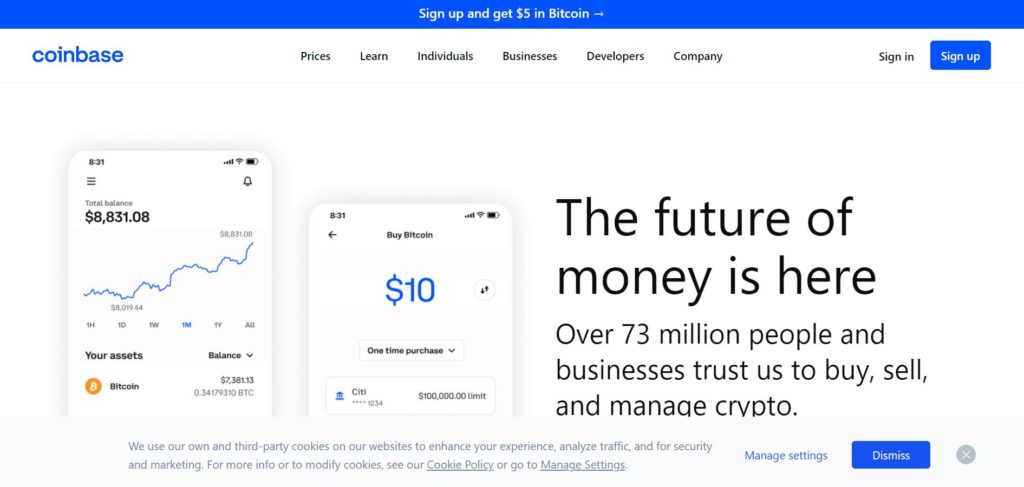
Coinbase is a good cryptocurrency wallet option, especially for beginners. It offers two storage options to help secure your digital assets. This includes the web wallet where you can access your cryptocurrencies and the mobile wallet app.
The mobile wallet app is advisable to use, especially if you are the type that likes to have access to your Bitcoins on the go. The wallets come with a strong security feature which includes a two-factor authentication in which codes are sent to your mobile for you to input and log in. Other notable security features on the app include a withdrawal time-lock and email confirmation before you can access your wallet.
The mobile wallet app can be found on the Play store for Android devices and the App Store for IOS. Through the Coinbase wallet app, you could also buy, sell, and trade cryptocurrencies.
Binance:

Aside from being one of the best trading platforms, Binance also has provision for cryptocurrency wallets storage. The platform doubles as an exchange that gives you access to over 1000+ markets. It covers all cryptocurrency-related activities, from large caps to defi tokens.
The platform gives you a large range of security like the cold storage of funds and two-factor authentication. It also has an email confirmation when trying to access your wallet with a new IP address.
You can get the Binance cryptocurrency wallet on Google Play for Android devices or the App Store for IOS. The app is decentralized, giving the user full control over their assets.
It is also possible to buy, sell, and trade cryptocurrencies within the Binance wallet. Besides Bitcoin, the Binance wallet supports over 40 open-source blockchain protocols and thousands of other digital currencies.
Huobi:

Huobi is one of the best multi-cryptocurrency wallets catering to a large variety of cryptocurrency products and assets. The platform offers a low trading fee, and its users can invest in over 350 cryptocurrencies on the platform.
The Huobi wallets stores close to 98% of customer funds in cold storage, protecting them from hacks or theft. Users also have full control over their cryptocurrency assets on the platform. This cryptocurrency wallet also supports 20 different cryptos, including Bitcoin and NFTs.
You can find the app on the iPhone App Store and Android Playstore.
Kraken:
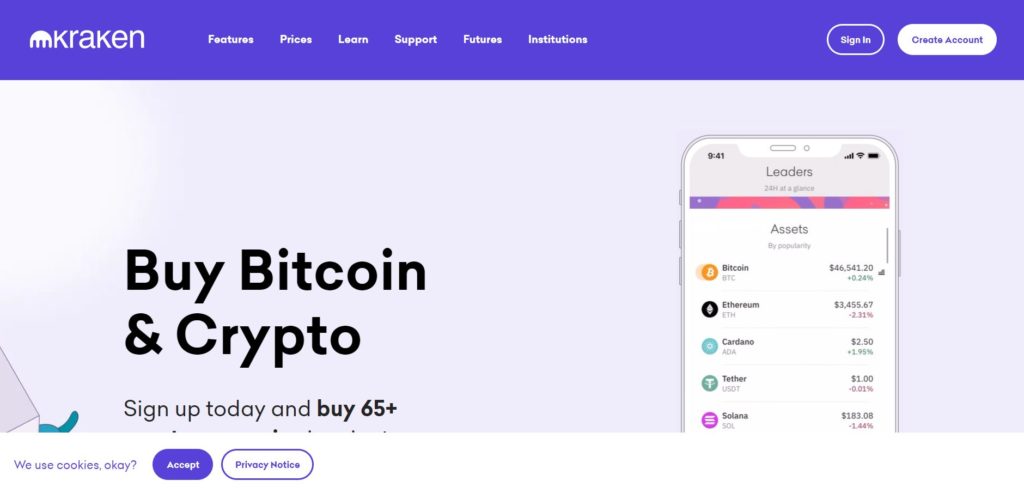
Kraken is one of the best cryptocurrency wallets. The platform majorly deals in trading, exchange, and margin trading in some specific areas.
The platform offers a web wallet where users can keep tokens.
Crypto.com:

Crypto.com is another one of the best multi cryptocurrency wallets. It offers a transparent fee structure, equating to a 0.4% fee on either side of the trade. The platform has a user-friendly interface, which makes it easy to use. You can also choose your transfer speed to save fees during payments or exchange-saving network speed.
Crypto.com wallet is available on both Google Play and the App Store. The wallet offers close to 100 cryptocurrencies, and users have full control over their private keys. In addition, there’s a staking option, which features nearly 35 tokens with no lock-up period.
Crypto.com has very strong security features encrypted with two-factor and biometric authentication.
Coinjar:
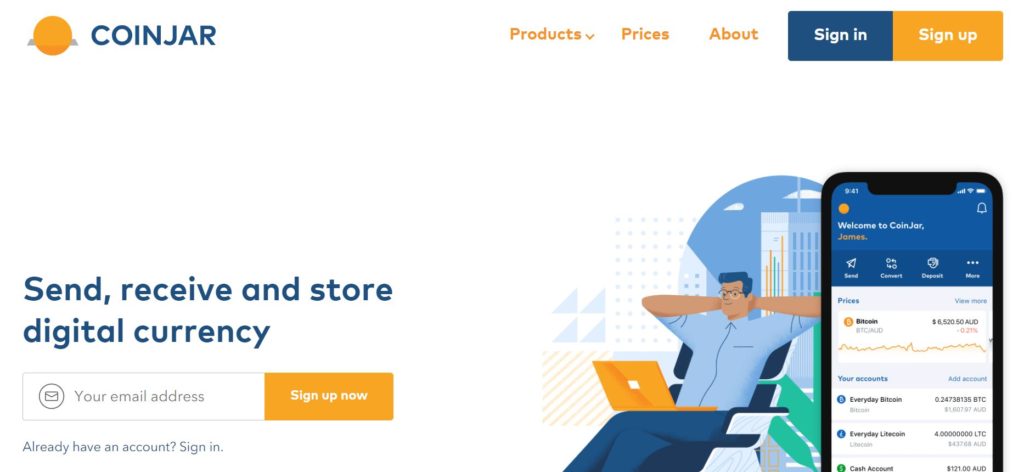
Coinjar is an online cryptocurrency platform to buy and sell digital assets on. It has a user-friendly interface making it easy for new users and old alike. The platform is one of the biggest currency brokers in Australia, and it recently entered the UK marketplace. The Australia Transaction Report and Analysis Center regulates all of the company’s activities, including its crypto management section.
Coinjar allows users to trade and exchange cryptocurrencies all day, and it has a relatively inexpensive fee structure. The platform comes with a mobile Bitcoin wallet available on Google Play and the App Store.
It also offers a ready-made cryptocurrency portfolio.
Luno:
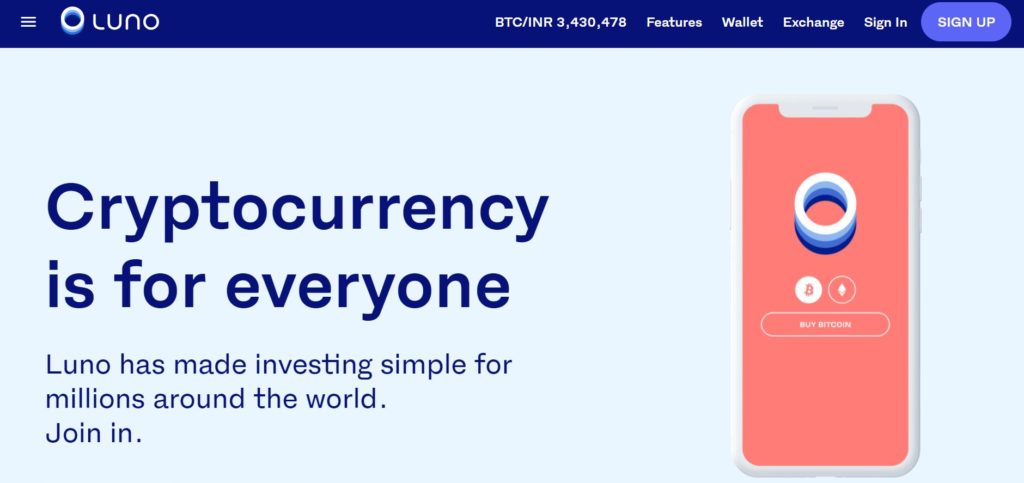
Luno is another crypto wallet where users can store cryptocurrencies. The platform makes it simple to buy and sell digital currencies. This is thanks to the fact that funding is done directly from your bank account.
The Luno wallet is a mobile app that can be downloaded from Google Play and App Stores. The wallet also accepts digital coins like Ethereum, Ripple, Bitcoin Cash, and Litecoin in addition to Bitcoin.
Luno has a ‘custodial’ wallet, which can be advantageous or disadvantageous depending on your needs. This means you’re entrusting Luno with the security of your Bitcoin. In simple terms, you don’t have control over your private keys if you use a custodial wallet.
The platform also helps you get your wallet back even if it gets hacked and you forget your login details, all you have to do is contact Luno support service.
Exodus:

As one of the best multi cryptocurrency wallets in the industry, Exodus has a reputation for offering cryptocurrencies with a wide range of wallet options. Exodus is a desktop wallet that supports over 150 different crypto assets and allows you to buy and sell crypto directly from the wallet interface – no registration required.
Furthermore, the Exodus desktop wallet will allow users to send and receive cryptocurrency via QR codes, with 24/7 customer support available in the event of any problems.
Exodus wallets all have a useful ‘restore’ feature, which means that if you lose your wallet’s details, you can recover them by entering the password you were given when you created an account.
It can be used with a variety of hardware wallets.
Mycelium:
Mycelium is another great cryptocurrency wallet to have. In terms of wallet privacy, Mycelium’s security setup is up there with the very best.
Setting up your wallet with Mycelium requires no personal information or identifiers, ensuring that crypto trading remains anonymous. The Mycelium wallet app, which is available for iOS and Android, has a simple interface that’s easy to master. There’s even an option to send and receive BTC via QR code.
Although the Mycelium wallet is a hot wallet, users can link it to Trezor, Ledger, and Keepkey hardware wallets to increase their security. The Mycelium wallet also can route transactions through the TOR network, which hides IP addresses and locations. Users’ anonymity is further enhanced as a result of this.
Finally, Mycelium includes an integrated marketplace within the wallet’s interface that allows you to quickly and easily buy and sell Bitcoin.
CoinCorner:

The Electrum wallet is worth considering if you want to buy Bitcoin and store it safely without any inconvenience. It is available as a mobile or desktop app. You have complete control over your private keys with the Electrum wallet, and you can recover your wallet and funds using a secret phrase if you ever lose access.
Electrum is also extremely fast because it indexes the Bitcoin blockchain rather than downloading it.
The Electrum wallet’s user interface isn’t as appealing as some of the other options on this list. However, it makes up for it with a variety of security features and add-ons. You can link your holdings with other people thanks to multi-signature support. Electrum also supports two-factor authentication and is compatible with several well-known hardware wallets.
The Electrum wallet can make use of the TOR network to mask IP addresses and increase user privacy.
The various types of wallets available are listed below. Please make an informed decision.
Paper Wallet:
Here, your keys are written on paper and stored in a secure location. This makes it more difficult to use your crypto because, as digital money, it can only be used on the internet.
Hardware Wallet:
Here, keys are stored on a physical device somewhere. Only when you need to use or access the crypto in the wallet will the wallet be connected to the internet.
A typical hardware wallet can work on almost all platforms, regardless of whether the platform is amongst the best multi cryptocurrency wallets or not.
Online wallets: Here, keys are stored on a platform that runs on the internet. This could be an app, website, or online software. In this system, sending, receiving, and using crypto is as simple as opening an online bank account, using a payment system, or using a brokerage.
How to Choose the Right Bitcoin Wallet for You
Below are the four important things you need to look out for before picking a cryptocurrency wallet to use;
1. It’s very vital for you to check if the cryptocurrency broker offers a custodian or non- custodian. A custodian offers to keep your private keys and Bitcoins in storage, and you are not the one in control.
2. You also have to look at the features of the app or website, if it offers margin trading, Futures, and educational materials with analysis Tools.
3. The number of coins the platform offers matters: you might be looking to trade some particular coins which might not be available on that particular platform. This is why it is important to look out for this info before picking a cryptocurrency wallet.
4. The interface of the app or website matters: the app should be easy to understand and be able to navigate around it.
How to Use a Bitcoin Wallet
Step 1: Register With eToro
Before you can use eToro’s wallet, you must first create an account with the company. It should only take you a few minutes to complete this task.
Here are the things you would have to:
1. Head over to the eToro website and click on the ‘Join Now’ button
2. Fill in your information, including your full name, home address, and date of birth.
3. Enter the code that eToro sends you via SMS to verify your mobile number.
4. A copy of your passport or driver’s license should be uploaded.
5. Upload a copy of your most recent bank statement or utility bill.
Step 2: Download the eToro Wallet to Your Phone
Then, go to either Google Play or the App Store and download the eToro wallet. Check if it’s the latest before installing it on your device. Login in your details, and you are good to go.
Step 3: Add Bitcoin to Your eToro Wallet
You’ll need to deposit your Bitcoin into your eToro wallet now that you’ve gained access to it. If, at this stage, you do not have any Bitcoin, you can buy some directly from within the eToro app.
You must make a minimum deposit of $10, then you can invest as little as $10. Debit/credit cards, PayPal, Skrill, and Neteller, are all acceptable payment methods.
However, if you already have Bitcoin, you’ll need to find your unique wallet address within the app. Copy it to your clipboard, then go to the Bitcoin wallet where it is currently stored. Then all you have to do is paste the wallet address and specify the amount of Bitcoin you want to send. In the next 20 minutes, the funds should appear in your eToro Bitcoin wallet.
Step 4: Keep or Sell Your Bitcoin
At some point, you will want to sell your coins or buy more and keep. It all depends on you and how the market changes.
Last words
For beginners, you may be feeling a little overwhelmed by all these. After all, not only do you need to think about the best Bitcoin wallet for your needs, but you also need to know about key metrics like private keys and public addresses.
All you just have to do is pick from any of the listed cryptocurrency wallets and pick your coin and invest. I will advise you to pick the eToro platform.
Frequently Asked Questions about cryptocurrency wallets
- What is a cryptocurrency wallet?
Like your regular wallet, piggy bank, or bank account, a crypto wallet is a place you keep the money. Except for this time, the money is kept in the form of a digital currency, rather than in Fiat currencies (USD, Euro, etc.)
Since the first cryptocurrency, Bitcoin, cryptocurrency wallets have started rising in popularity. As you can imagine, BTC’s sharp rise in value shortly after its launch gave people the notion that cryptos can be kept (HODL) until it’s valuable enough to be sold. But to do this, a safe place is needed – somewhere third parties and cyber criminals can’t hack into. All of these led to a spike in the popularity of crypto-wallets.
But it’s safe to say cryptocurrency wallets are as old as the first crypto itself. Because without a wallet, storing digital currency safely will be next to impossible.
- How do crypto wallets really work? Are my coins stored inside a wallet somewhere?
Well, it might shock you to hear that the term cryptocurrency wallet doesn’t actually refer to an ‘actual wallet.’ It’s only a term used to describe something else entirely – your private keys.
“If a crypto wallet isn’t an actual wallet, what then is really going on? What the heck is a private key? I’m confused here….”
Don’t worry; we’ll explain everything.
First of all, do you know why cryptocurrencies are called ‘crytocurrencies?’ Because each coins system is programmed and secured by cryptographic algorithms. Cryptographic algorithms are sequences of rules used to code and decode messages in a cryptographic system.
Forget all the jargon. The point here is that in order to access a cryptographic system (the chain of algorithms backing your crypto), you need a set of private keys (like a password) only known to you. These private keys, or digital keys, are what help you gain entry into a cryptosystem.
In other words, anyone with a set of private keys to a cryptosystem can access that system at that moment in time.
Now, what your wallet actually does is that it stores these private keys for safekeeping. That way, the keys don’t fall into the wrong hands.
All these might sound like too much jargon for some people. So let’s paint a hypothetical picture.
The hypothetical scenario of how a wallet actually works
Imagine someone wants to send you 0.5 Bitcoin (BTC). To receive these coins, you’ll need to provide your wallet address. As soon as the person sends the coins, you’ll receive a notification from your wallet provider stating that a certain amount of BTC has entered your wallet.
You’ll see the coins listed under the BTC address when you check your wallet. Naturally, you want to believe the numbers you see on the screen (0.5 BTC) are a reflection of where your coins are – on the platform of the wallet provider. But that’s not really the case.
Your bitcoins are not actually stored in that wallet you see on the screen. That fraction of coins you see is just a confirmation that you have that amount of coins in the BTC blockchain system. Since the BTC blockchain system is even a public one (decentralized), anyone from anywhere in the world can see the transaction that led to you receiving 0.5 BTC (although they won’t know you’re the recipient).
What separates you from these people is your private keys (stored in your wallet address). The keys allow you to enter the public blockchain to access and manage your coins.
As you can imagine, random persons could easily gain access to various entries on the blockchain without these special keys.
By and large, anybody can see Bitcoins on the public blockchain systems, but only those with special keys (gained through access to wallet addresses) can access and spend these coins.
- How do people hack into wallet addresses and steal cryptocurrency coins?
Crypto theft is one of the most common subjects of discussion in the crypto world. Almost every time, we hear reports of someone’s wallet being ransacked. This must be scary news for crypto wannabes. But how exactly does this happen?
Let’s answer that.
First of all, in order to attack a cryptocurrency wallet and steal the coins inside, the attacker must have had access to one thing – the private keys protecting that wallet address. This is why a wallet provider will constantly remind its users to safeguard their private keys at all costs.
Yet, despite this, people still fall victim to crypto thefts. How does that happen? I’ll tell you.
1) Through phishing emails: out of the blue, someone might send you an email asking you to enter your private keys or your wallet backup (a 24 recovery words) on a website or app to enjoy certain freebies. Once you click the link in the email to enter your crypto details, the hacker’s system quickly picks up the information and then takes a shot at your wallet. This is known as a phishing email scam.
Usually, newbie crypto users are the ones that fall quickly for this kind of scam. Beware.
2) Through malicious attacks: How many times have you had a message from your computer’s anti-virus program telling you to fix certain things because your PC could be the target of a threat? Believe it or not, we live in an age of constant cyber threats. And this is extended to the crypto space. Every now and then, cybercriminals plant bugs and malicious software in our mobile phones and computer systems without us even knowing. They do this through the apps we download online and mostly through the free websites we visit (for games, movies, and the likes). Once this bug enters your PC, it monitors your clipboard for Bitcoin addresses. Once it finds one, it sends it straight to the attacker.
The best way to stay ahead of this threat is to always assume your phones and computers can be (or have been) compromised, therefore taking measures to re-secure them.
3) Local attacks: If someone has access to your phones or computers, they could plant bugs that send hidden details to them. Hidden details like your credit card details, bank details, cryptocurrency wallet details, etc.
- Is it true that once I lose my wallet address, I’ve lost my cryptocurrencies also?
A lot of myths fly about, especially on the internet. But this one isn’t true. Nobody loses their Bitcoins or ether just because they forgot the password to the wallet or because their PC got bad and can no longer access the wallet software.
When you create a crypto wallet, you’re given a chance to recover your address in case of theft, hack, or loss of access. This comes in the form of some 12 or 24 recovery phrases.
Your wallet provider will provide you with these phrases and will instruct you to keep the phrases safe for situations when you lose access to your wallet address.
- What are the different types of crypto wallets?
Technically speaking, there are two types of crypto wallets. These include:
Software wallets (or soft wallets)
Hardware wallets (Hard wallets)
Soft wallets can be categorized into:
Online wallets: also known as web wallets, these types of wallets allow you access through a web browser. It’s not advisable to keep all your coins in these types of wallets, as they’re easily targeted and vulnerable to cyber-attacks.
Mobile wallets refer to wallets that are downloadable over a mobile phone. They’re a little more secure than web-based wallets because an attacker would need access to the phone to gain entry. E.g., Trust wallet.
Desktop wallets: these store coins in an offline mode. Therefore, it’s more secure than the online and mobile wallet options.
